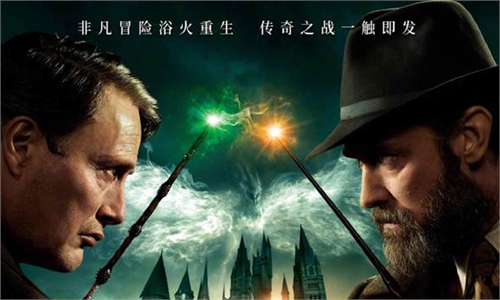ARTS / FILM
Stories of Chinese families in US films stuck in the past
Old wine in new bottles

Promotional material for Everything Everywhere All at Once Photo: AFP

Promotional material for Everything Everywhere All at Once Photo: AFP
"I've been obsessed with my mom's approval my whole life. I couldn't risk losing it." "Honoring your parents sounds great, but if you take it too far, you might forget to honor yourself." "Wait? Wait? No time to wait today. Joy, any other time, I beg you to come and eat, or call me, or anything, but today very busy."These are lines concerning the relationship between Chinese parents and their children picked from the hit 2022 movies Turning Red and Everything Everywhere All at Once, which belong to very different genres but share similar themes about Chinese families.
The relationships among Chinese family members seem to have become a popular theme for US studios recently. It seems to have paid off too as the two films have gained good word of mouth worldwide.
The films are full of creative ideas and fantasy content, but at the core of the works are the images of Chinese parents, especially moms, who are depicted as strict, unsmiling and demanding, just like in other works made dozens of years ago.
However, Chinese families, both in China and abroad, have been gradually changing. More and more parents today are studying educational philosophy and advocate the idea of respecting the wants of children. To stay up to date with today's trends, experts in China are calling on Western filmmakers to focus more on these new stories to dispel the stereotype of "horrible Chinese moms."
In the movies
Everything Everywhere All at Once, a US absurdist comedy-drama film written and directed by Dan Kwan and Daniel Scheinert, follows Chinese-American woman, Evelyn Wang, (Michelle Yeoh) who discovers that she must connect with parallel universe versions of herself to prevent a powerful being from causing the destruction of the multiverse.
Aside from the action plot, the film also delves deeply into Wang's relationship with her daughter Joy.
The mother-daughter relationship in this Chinese immigrant family is described as the equivalent of a World War at the beginning of the film.
Wang has no time or patience to listen carefully to her daughter at the beginning of the movie and is constantly nagging Joy such as criticizing her weight. She also refuses to introduce Joy's girlfriend to her father and does not give her daughter her blessings. The poor relationship between mother and daughter and her strict upbringing causes Joy to go ballistic and take extreme measures.
In Turning Red, an animated fantasy comedy film produced by Pixar Animation Studios, the story follows Meilin "Mei" Lee, a 13-year-old Chinese-Canadian student who, due to a hereditary curse, transforms into a giant red panda when she experiences any strong emotion.
A typical overachiever, the core of Lee's efforts at school and home are to make her strict, overprotective mother Ming proud.
Ming, like Wang, also makes decisions according to what she thinks is right or wrong for her daughter, causing Lee to lack the courage to tell her mom what she truly enjoys.
According to Shi Chuan, vice chairman of the Shanghai Film Association, "this emphasizes the ancient image of women, that they put the needs of others, such as their children or husband, first but in doing so make decisions for them instead of treating them as equals. But obviously this is not in line with the current situation in China."
Shi added that although the movie does depict situations in real life, but continued rigid presentation will indeed exacerbate the stereotype.
Today's reality
"Though this movie is packaged with the popular notion of the multiverse, the core of the movie still conveys an old version of a Chinese family from decades ago," Li Tong, a 30-year-old Beijing-based feminist who recently just finished watching Everything Everywhere All at Once, told the Global Times.
"Both films focus on conflict within mother-daughter relationships. It is quite different from the current situation in China, where a career and equality is important to today's young mothers," Li noted.
As Li said, Chinese parents' views on child-rearing are changing and more parents are seeing the value in treating their children as equals when talking with their children.
Zhang, a mother of an 11th-grade student in a Beijing high school, told the Global Times that she very rarely forces her daughter to study. And before making any decisions, even including where they want to go on the weekends, she asks her daughter for suggestions.
"I also applied for her to take some after-school classes, but I always asked if she wanted to attend these lessons. Some classes such as horse riding and jazz dancing attracted her a lot, and then I told her to stick with completing the courses since it was a decision she made."
In overseas Chinese families, equality and children's opinions are also important. Abao, a Chinese teacher working at a public school in Australia, created songs based on ancient Chinese poems with his daughter Emily after the little girl showed an interest in his job.
In Abao's music videos, Emily often appears and happily sings these songs together with her father.
"Among the Chinese families I know in the US, most of them do care about their children's education but are relaxed about the issue. One set of parents takes their children to go hiking every weekend," a student learning abroad told the Global Times.




